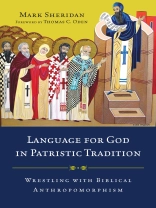Criticism of myth in the Bible is not a modern problem. Its roots go back to the earliest Christian theologians, and before them, to ancient Greek and Jewish thinkers. The dilemma posed by texts that ascribe human characteristics and emotions to the divine is a perennial problem, and we have much to learn from the ancient attempts to address it.Mark Sheridan provides a theological and historical analysis of the patristic interpretation of Scripture?s anthropomorphic and anthropopathic language for God. Rather than reject the Bible as mere stories, ancient Jewish and Christian theologians read these texts allegorically or theologically in order to discover the truth contained within them. They recognized that an edifying and appropriate interpretation of these stories required that one start from the understanding that ‘God is not a human being’ (Num 23:19). Sheridan brings the patristic tradition into conversation with modern interpreters to show the abiding significance of its theological interpretation for today.Language for God in Patristic Tradition is a landmark resource for students of ancient Christian theology. Wide-ranging in scope and accessible in its analysis, it demonstrates that those engaged in theological interpretation of Scripture have much to gain from studying their forebears in the faith.
Jadual kandungan
Foreward by Thomas C. Oden
Note of Gratitude
Abbreviations
Introduction
1. God is not like Humans
2. The Philosophers? Critique
3. The Hellenistic Jewish Interpretation
4. The New Testament
5. Early Christian Writers
6. Three Specific Cases
7. The Special Case of the Psalms
8. A Comparison of Ancient and Modern Interpretations
Appendix: Ancient Christian Hermeneutics: The Presuppositions, the Criteria and the Rules Employed
Biographical Sketches of Early Christian Writers and other Significant Authors
Select Bibliography
Name and Author Index
Subject Index
Scripture Index
Mengenai Pengarang
Originally from Washington, DC, Mark Sheridan is a Benedictine monk of Dormition Abbey in Jerusalem and professor emeritus in the Faculty of Theology of the Pontificio Ateneo S. Anselmo, Rome, where he served as dean of the Faculty of Theology (1998-2005) and Rector Magnificus (2005-2009) of the Athenaeum. Among his publications are Genesis 12-50 in the Ancient Christian Commentary on Scripture series, Rufus of Shotep: Homilies on the Gospels of Matthew and Luke, and From the Nile to the Rhone and Beyond: Studies in Early Monastic Literature and Scriptural Interpretation. He is a specialist in Coptic language and literature.












